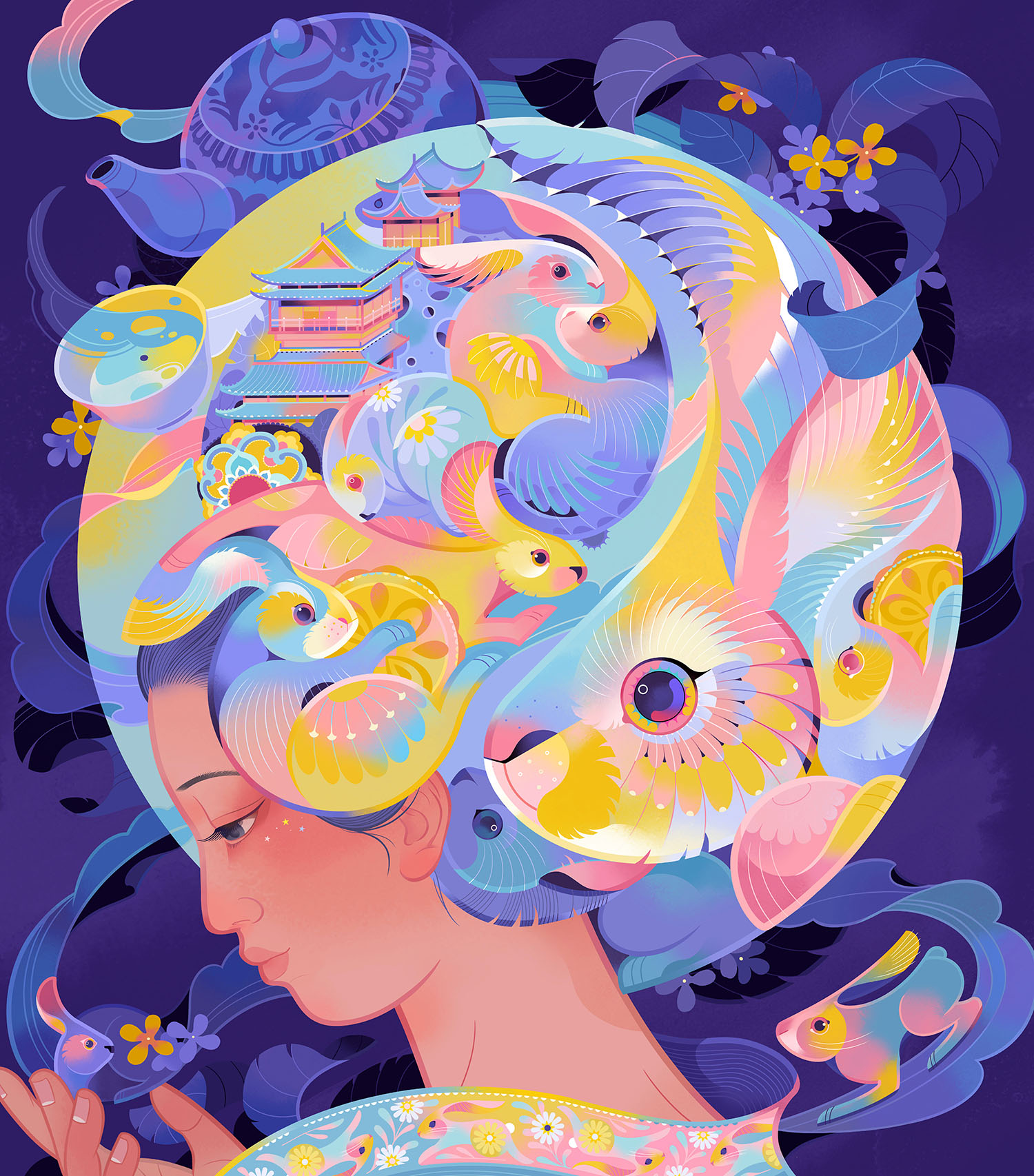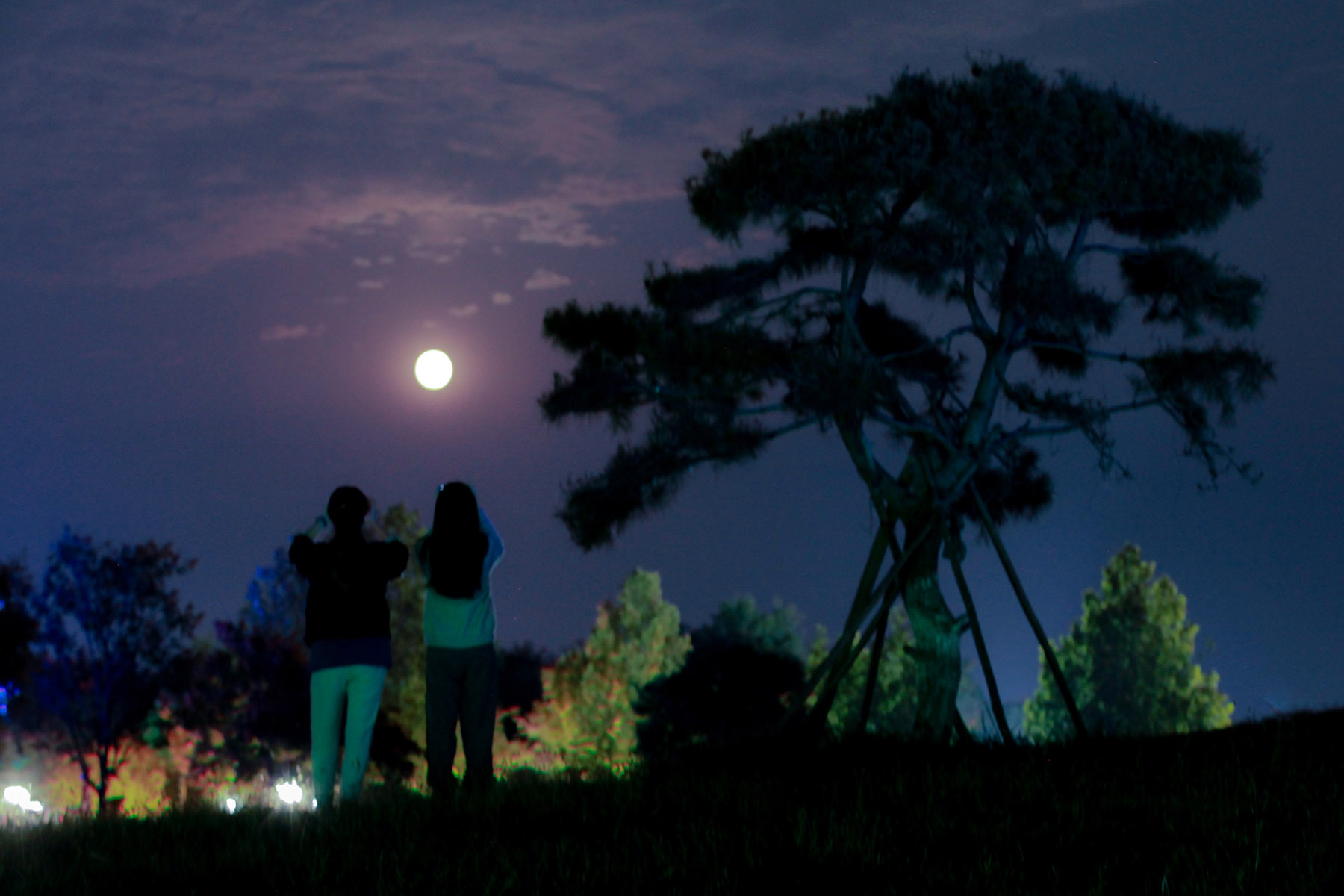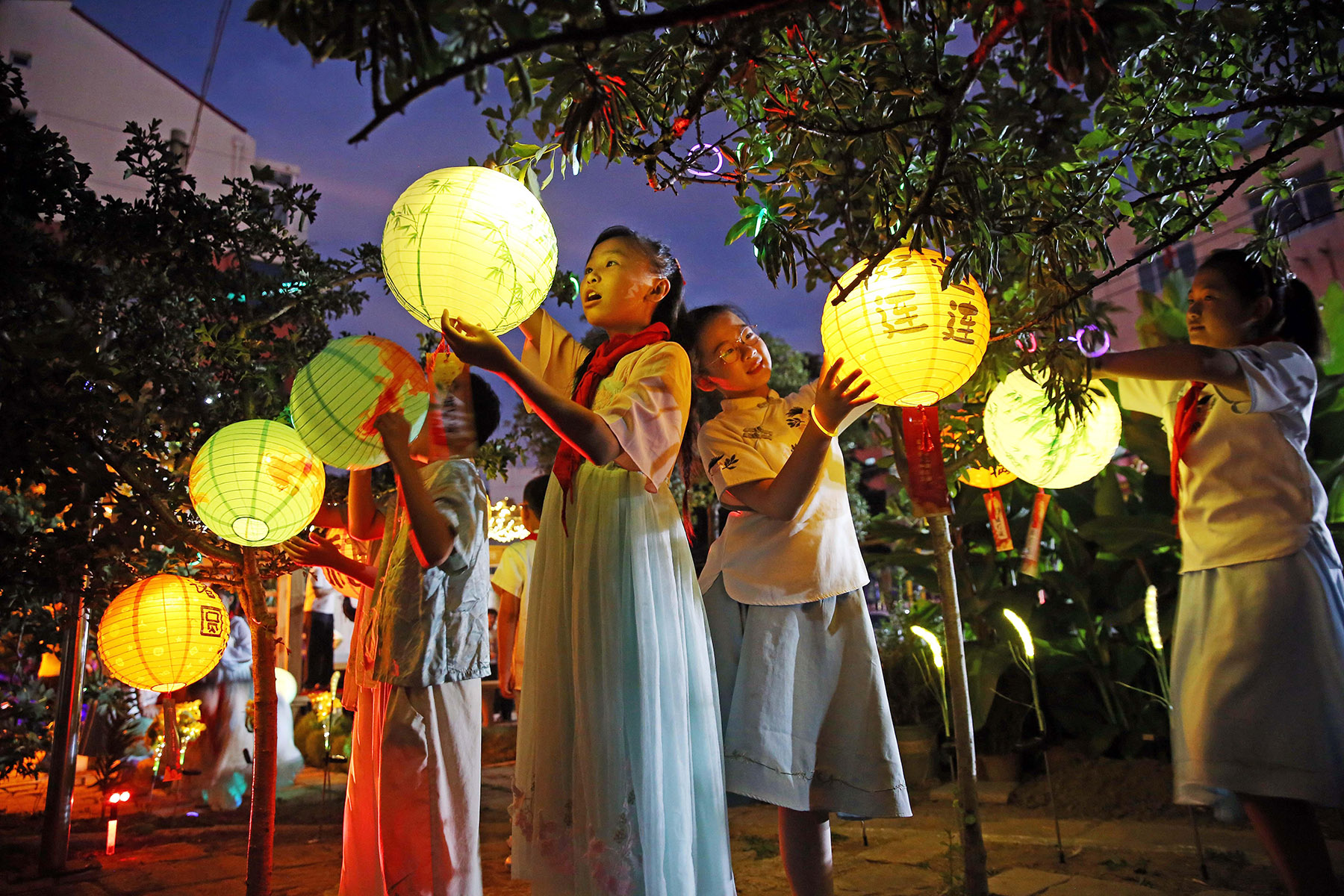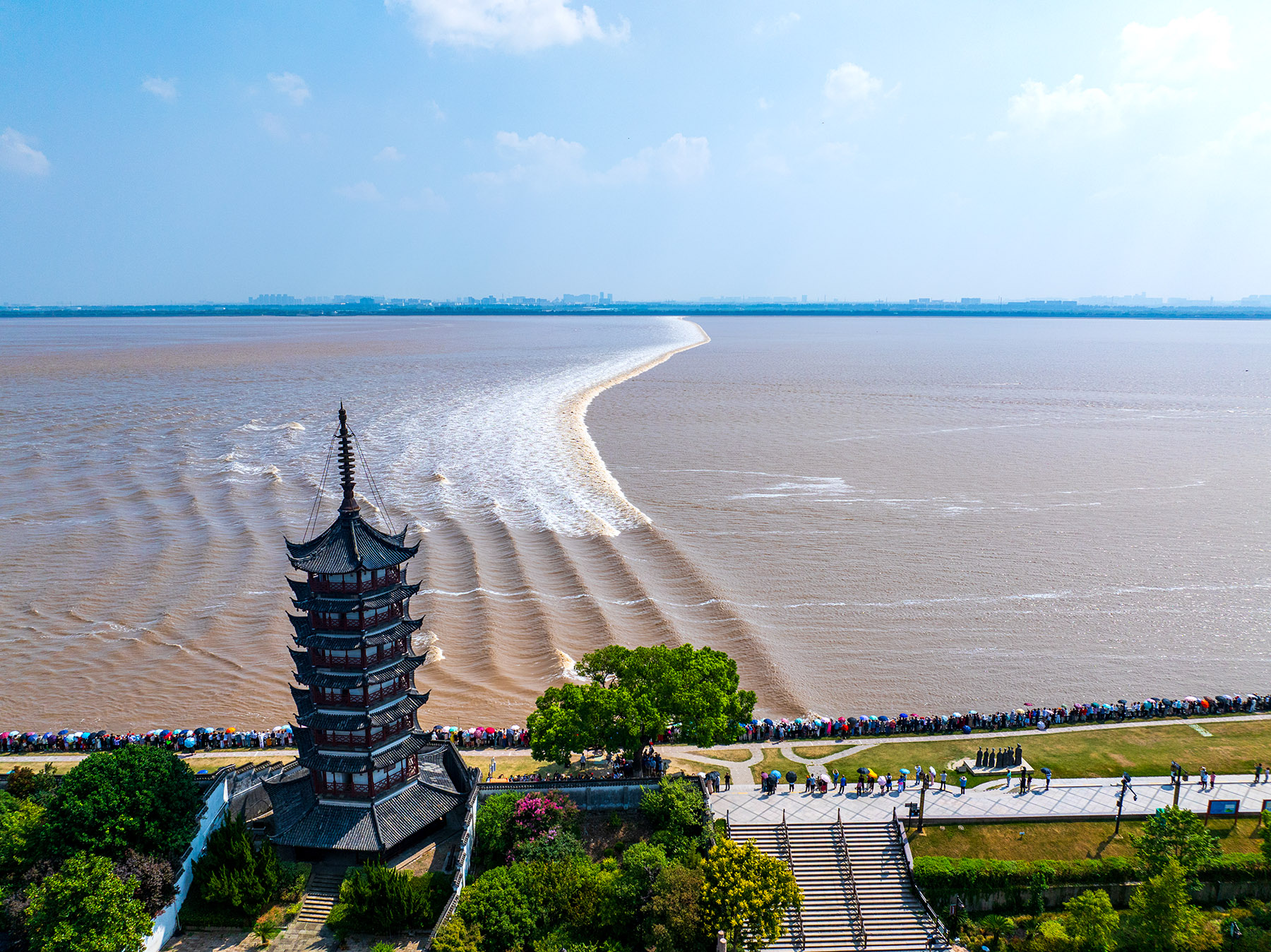Poetry has given the lunar light a special romantic and emotional significance

It could be arguably assumed that as one ages, their emotional bond with the moon intensifies, bearing that imaginable vision in mind, extra clear in the dead of night, of themselves and their beloved ones, no matter how distant, sharing the same moonlight.
When they've seen more of life's vicissitudes and fatalistic loneliness, the moon's solid companionship becomes even more precious, just as the unwavering support they draw from the family behind them and their roots, whose gentle gaze shimmers like moonlight piercing the darkness.
In the Chinese Lunar Calendar, there are three major celebrations of a full moon, a metaphor of the completeness brought along by a family reunion.
The first of a brand-new year, the Lantern, or Yuanxiao Festival, is when the year gone becomes past and with that pure, round moon hanging in the night sky rising hope is infused into new year resolutions, and one feels determined and omnipotent to bring their family a better taste of life.
The seventh full moon, called the Zhongyuan Festival or the "Ghost Festival", is to mourn lost ones with an unspoken wish for their spirits knocking at the door or visiting in dreams.
READ MORE: China sees travel surge on first day of Mid-Autumn Festival holiday
Due to the many connotations with which people have endowed autumn through the ages, both joyful and sorrowful, the Mid-Autumn Festival is only just barely overshadowed by the bustle of Spring Festival, and is constantly referenced in literature and art.
Autumn is a season for harvest and decay alike. Autumn is a season of varied colors: flaming maple leaves, amber persimmons, golden sweet-scented osmanthus and straw rolls in the field. Autumn is a season for the sounds of falling leaves, cracks of pomegranates and songs of migratory birds flying south.
It is in this light that the Mid-Autumn Festival, falling on the 15th day of the eighth lunar month, holds in it both the joy of fruitfulness and lament of things past and the ice-cold winter ahead, and that, no different from many other prominent literary works, it seems ancient poetry could only be told long and wide by revealing the frustrations left in contrast to the completeness of the full moon, and the solitude felt in crowds.

Northern Song Dynasty (960-1127) literati Su Shi (1037-1101) marked the Mid-Autumn Festival in 1076. He was at the time governor of Mizhou, today's Zhucheng city in Shandong province.
Missing his younger brother — by then Su had lost both parents and elder sister and been demoted far from home — he wrote down the household lines about the moon, Prelude to Water Melody, which have been read and sung for almost 1,000 years.
A translation by Nobel nominated Chinese writer Lin Yutang (1895-1976) conjures up a rich imagery:
Why does she, bearing us no grudge,
Shine upon our parting, reunion deny?
But rare is perfect happiness —
The moon does wax, the moon does wane,
And so men meet and say goodbye.
"It was in Michow (Mizhou), thinking of his absent brother, that he wrote what is considered the best poem on the mid-autumn by any poet. Critics say that after this poem was written, all the other poems on the harvest moon could be well forgotten," reads Lin's biography of Su, The Gay Genius: The Life and Times of Su Tungpo, originally written in English and published in 1948. Su Tungpo, or nowadays, Su Dongpo, is another name of Su Shi.
Su, a polymath and talented in literature, calligraphy and painting, rose to fame at a young age. Throughout his official career, he served in many places across the country and cared for the people. Legacies of his good deeds passed down through history.
Yet, a hopeless, righteous dissenter, he was promoted and demoted over and over again, experiencing a full play of fickleness in human relations.
"It was a matter of sustenance of the spirit to have on one's shelves the works of a man with great charm, originality, and integrity of purpose, an enfant terrible, a great original mind that could not conform," Lin wrote of Su, the mention of whom, as he put it, always elicits an affectionate and warm admiring smile in China.

In his life, Su created many works on the Mid-Autumn Festival.
His sole brother by his side, he wrote of the cloudless sky, cool air, the Milky Way and the moon round as a jade plate — a wonderful night of course, but not so often had Mid-Autumn Festival been like that, he thought, and the current happiness could not withstand the sorrow of the upcoming parting, nor could it declare a brighter future ahead of him.
The following year, the two brothers were parted on the Mid-Autumn Festival, and Su was not in a good physical condition. They exchanged poems written for each other by mail. Su's long poem described multiple images and emotions to the extreme, so as to comfort his brother.
Lin pointed out that it's striking that his brother always made the occasion for Su to write some of his best poetry.
Through another poem in dedication to his absent sibling, translated by late scholar Xu Yuanchong, Su's true heart was told, full vent toward what he'd learned about the vanity fair and of the concern for public affairs, hidden deeply in lines seemingly describing the most common evening scenes:
Like dreams pass world affairs untold,
How many autumns in our life are cold?
My corridor is loud with windblown leaves at night.
See my brows frown and hair turn white!
Of my poor wine few guests are proud;
The bright moon is oft veiled in cloud.
Who would enjoy with me the mid-autumn moon lonely?
Wine cup in hand, northward I look only.
More than once, alone, Su inherited the spirit of Tang Dynasty (618-907) poet Li Bai, a hearty drink taken, dancing with the moon and his moonlit shadow, or feeling as if he were riding the wind to visit the legendary palace in the moon — his spiritual home — ascending to become an immortal and removed of the troubles of the human world.

Legend has it that in the fancy crystal and jade palace of the moon reside fairy Chang'e, a rabbit, a toad and an osmanthus tree. Her husband Houyi shot down nine redundant suns to end torridity and crop failures of the world and was awarded the elixir of longevity. Chang'e swallowed the whole of the elixir secretly, floated off the ground and flew toward the moon.
A young and beautiful immortal, yet her atonement is to stroll up and down in the cold, desolate palace for eternity, solitude being her accompany, together with ceaseless labor of the rabbit and toad grinding to make futile elixirs.
Su, in the end, fed his poetry nostalgia for the human world, which he was nonetheless loath to leave, while making no secret of his anguish soothed by his optimism, passion and generosity.
It's always the duality, either in Su's literary works or of all those well-known ancient legends about the moon, that makes the day evocative, apart from the serving of mooncakes and lantern exhibitions, family gatherings, feasts and ceremonial admiration of the full moon.
An unchangeable cycle emerges with the moon's ever-changing wax and wane. Alongside its delicacy and serenity as it usually impresses people with, the moon lets out its power and grandeur every now and then.
Around new moon and full moon, when the sun, the Earth and the moon stand almost in a straight line, the gravitational pull of the sun and moon lifts the tides on Earth to their maximal range.
At this time of the year, within three days after the Mid-Autumn Festival, roaring tides of the Qiantang River, mostly in East China's Zhejiang province, drench everything that gestures a challenge, making a name as a spectacle for millenniums.
One creation of Southern Song Dynasty (1127-1279) poet Yang Wanli (1127-1206) compares the swells to city walls made of silver, or as if wrapping the Qiantang River with a jade belt.
On the Mid-Autumn Festival of 1073, Su observed the tidal bore during his tenure in Hangzhou and recorded his reverence and awe into a suite of poetry. In the first of the five poems he wrote:
Tell the Moon Goddess not to lock the door tonight,
Tis best to watch the tidal bore in the moonlight.
Southern Song Dynasty court painter Li Song (1166-1243) marked these lines on one of his works that depicts the scene of nobles watching the tidal bore from a luxurious mansion. This painting is among the collection of the Palace Museum in Taipei.
A full moon hangs on top of mountains shrouded in mist, and a small boat in the distance moves forward steadily. Not far from the river bank, a spring tide surges forward, its crest pushing and shoving, spraying water drops like pearls and jade, its momentum akin to a stampede of ten thousand horses, interprets Wang Aihua, doctoral candidate at the School of Philosophy of Zhejiang University.
ALSO READ: Mid-Autumn Festival: APAC countries captivated by Chinese cultural events
She's been writing to introduce and appreciate ancient Chinese paintings since September 2020, based on the achievements of the grand book project A Comprehensive Collection of Ancient Chinese Paintings, led by Zhejiang University and the provincial cultural heritage administration of Zhejiang, which has systematically compiled images of more than 12,000 ancient Chinese paintings housed in over 260 museums and cultural institutions at home and abroad.
In Li's painting, the luxurious timber-structured mansion has intricately carved beams and painted rafters. Surrounding trees are turning yellow. Onlookers lean against the railings in small groups, gazing out at the tidal spectacle. It's a pity that the figures have faded, and their expressions can no longer be identified, according to Wang.
"Seeing the tide, some sigh at the gathering and parting of life, some contemplate its ups and downs, while others have generated courage to stand on a high tide and battle through the challenges of life.
"The tides rise and the moon sets just like in Li Song's time, waiting for generations of people to find their own sentiments within them," Wang adds.


